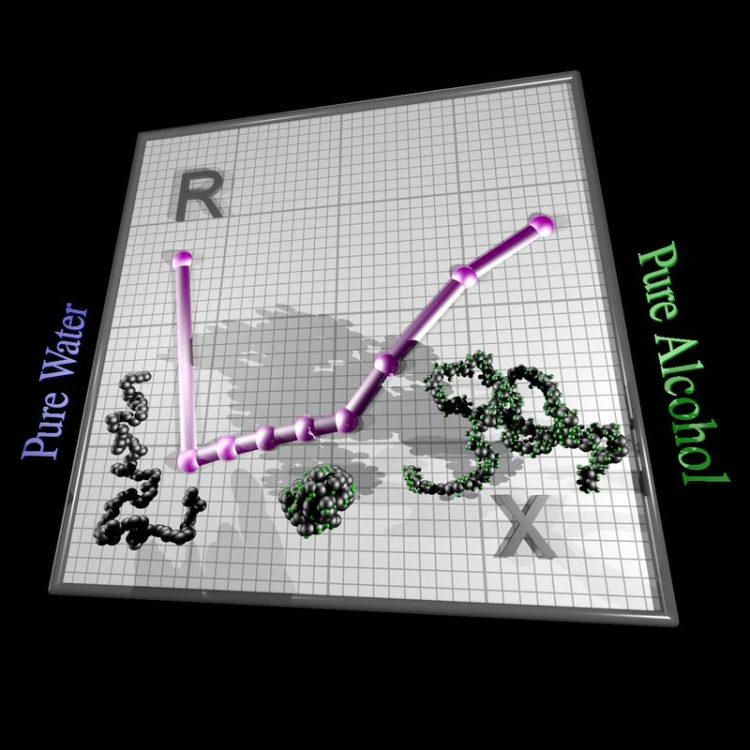Smart polymers: Complex matter where simplicity matters

Stimuli responsive polymers show an interesting coil-globule-coil transition in mixed solvents © Nature Communications
MPI-P scientists Kurt Kremer and Debashish Mukherji, together with their collaborator Carlos Marques from the French Centre national de la recherche scientifique (CNRS), propose a novel framework to understand the solubility of smart polymers in solvent mixtures. Combining “generic” molecular simulations with analytical theory, they solve a long standing question to explain the microscopic mechanism behind smart polymer collapse in mixtures of good solvents. Their results and findings are published in the most recent issue of the scientific journal “Nature Communications”.
Smart polymers are a modern class of polymeric material: they can be both artificial and produced by chemists or natural, as is the case for peptides. They exhibit a wide range of exotic and unpredictable behaviors when dissolved in mixed solutions. For example, while water and alcohol are well miscible and, individually, good solvents for several smart polymers, the latter precipitate in water-alcohol mixtures.
The intriguing behavior of solvent mixtures that cannot dissolve a given polymer, when the same macromolecule dissolves well in each of the cosolvents, is termed as co-non-solvency. Thus far the understanding of this effect is a matter of intense debate and, as such, it has eluded any generic explanation. Combining molecular dynamics simulations and analytical theory, they show that the co-non-solvency effect is a generic (independent of chemical details) phenomenon.
Their findings suggest that when a polymer is dissolved in a mixture of solvents, such that one of the (co)solvents likes the polymer even more than the other, this co-non-solvency effect can be observed. Therefore, a broad range of polymers are expected to present similar reentrant behavior.
One of the most intriguing findings of this work is that a polymer collapses even when the solvent quality becomes better-and-better by the addition of the better cosolvent, making the polymer conformation independent of the solvent quality. “This decoupling of solvent quality and polymer conformation is unexpected and new, opening interesting views for instance on the solution processing of polymers or biomedical applications such as pharmaceutical encapsulation” explains Kurt Kremer, director at the Max Planck Institute for Polymer Research.
These results not only provide the microscopic understanding of the co-non-solvency effect, but they also open new perspectives towards an operational understanding of macromolecular solubility within a simplified computational and/or theoretical framework.
http://www.mpip-mainz.mpg.de/4047686/Smart-polymers – press release and original publication
http://www.mpip-mainz.mpg.de/polymer_theory – information about Prof. Kremer's research
http://www.mpip-mainz.mpg.de/home/en – Max Planck Institute for Polymer Research
Media Contact
All latest news from the category: Physics and Astronomy
This area deals with the fundamental laws and building blocks of nature and how they interact, the properties and the behavior of matter, and research into space and time and their structures.
innovations-report provides in-depth reports and articles on subjects such as astrophysics, laser technologies, nuclear, quantum, particle and solid-state physics, nanotechnologies, planetary research and findings (Mars, Venus) and developments related to the Hubble Telescope.
Newest articles

Machine learning algorithm reveals long-theorized glass phase in crystal
Scientists have found evidence of an elusive, glassy phase of matter that emerges when a crystal’s perfect internal pattern is disrupted. X-ray technology and machine learning converge to shed light…

Mapping plant functional diversity from space
HKU ecologists revolutionize ecosystem monitoring with novel field-satellite integration. An international team of researchers, led by Professor Jin WU from the School of Biological Sciences at The University of Hong…

Inverters with constant full load capability
…enable an increase in the performance of electric drives. Overheating components significantly limit the performance of drivetrains in electric vehicles. Inverters in particular are subject to a high thermal load,…





















